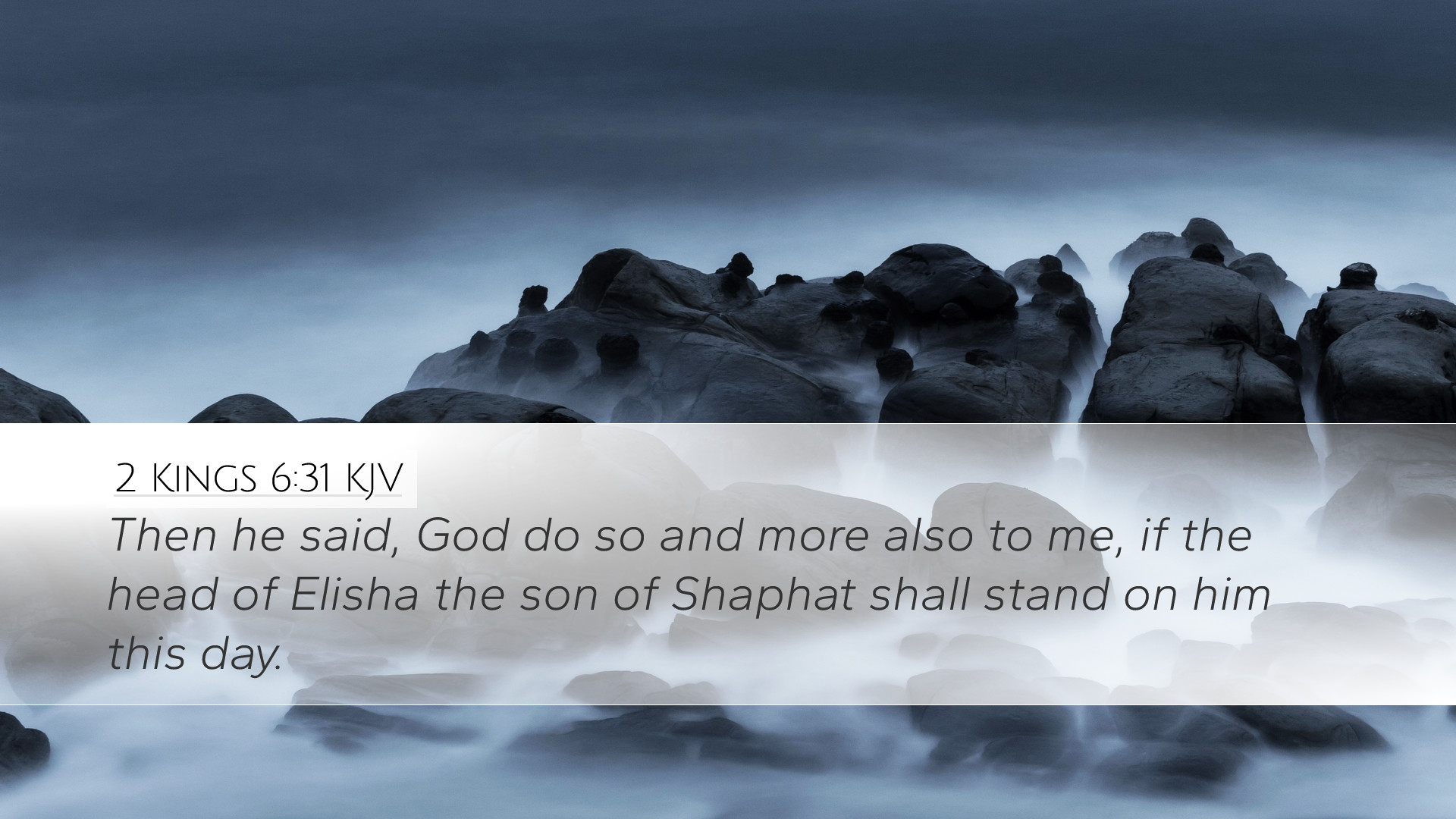Commentary on 2 Kings 6:31
2 Kings 6:31 states, "Then he said, 'May God do so to me and more also, if the head of Elisha the son of Shaphat remains on him today.'" This verse provides a glimpse into the dire situation in Samaria during a time of great famine, reflecting both the king's desperation and the ongoing conflict between the prophet Elisha and the Israelite leadership.
Contextual Background
The historical context of this verse is crucial for understanding its implications. At this time, the city of Samaria was besieged by the Arameans, leading to extreme famine within the city. The king of Israel, Joram, faced the scorn of his subjects who were suffering immensely (2 Kings 6:25). The escalating situation brings to light the importance of prophetic authority and the perception of God’s guidance amidst national crisis.
Insights from Matthew Henry
Matthew Henry comments on this verse, emphasizing the emotional turmoil experienced by the king. He notes that the king’s vow to kill Elisha reflects a tragic moment of accountability and misdirected anger. Henry highlights three key points:
- Desperation: The intensity of the famine led Joram to an irrational conclusion, blaming the prophet instead of seeking divine intervention.
- Injustice: Elisha had provided hope and guidance, yet the king chose to turn against him, showcasing human tendencies to misplace blame during hardship.
- Prophetic Protection: Henry underscores that, while the king sought the blood of the prophet, God's purposes would not be thwarted, and divine protection over Elisha remains significant.
Insights from Albert Barnes
Albert Barnes offers a theological perspective on the nature of the prophetic role in times of calamity. He notes:
- Authority of Prophets: Barnes articulates the challenging position of prophets as they often become scapegoats in times of social and political unrest.
- Divine Judgment: The emphasis on the king’s threat signifies the deeper spiritual blindness that can occur in leadership when disconnected from God’s counsel.
- God’s Sovereignty: Barnes reassures that, despite the king’s threats, God’s sovereign will regarding Elisha will prevail, demonstrating that human actions cannot thwart divine plans.
Insights from Adam Clarke
Adam Clarke provides a detailed interpretation focusing on the psychological and social realities of the king's statement. He expresses several observations:
- Expressions of Agony: Clarke highlights the despair that the king experiences, which drives him to speak out against the prophet, showing how pressure can lead to harsh and oftentimes irrational words.
- Symbolism of the Head: The reference to Elisha's head symbolizes not just the prophet's life but the broader prophetic mission and the hope it represents for Israel.
- Human vs. Divine Response: Clarke points out the contrast between human response to crisis—typically rooted in fear and anger—and the divine response which remains steadfast in love and purpose.
Theological Implications
This verse, within its larger narrative, calls leaders to reflect on their reliance on human wisdom versus divine counsel. It teaches that amid famine and hardship, God’s prophets are often at the forefront, offering hope, yet may face persecution from those in authority. The essence of this passage warns against the blinding nature of despair and the tendency to misdirect blame during collective suffering.
Application for Today’s Reader
For pastors and theologians today, the lesson from 2 Kings 6:31 remains poignant. It challenges leaders to:
- Seek God’s Guidance: In times of crisis, leaders must prioritize divine insight over human reasoning.
- Honor the Prophetic Voice: Recognizing and valuing the role of prophets and spiritual leaders is crucial, especially in community distress.
- Eschew Desperation: Avoiding rash decisions that may lead to injustice is vital for righteous leadership.
Conclusion
2 Kings 6:31 serves as a powerful reminder of the challenges faced by prophets and the responsibilities of leaders. The insights extracted from the commentaries of Henry, Barnes, and Clarke provide a rich tapestry of understanding that can inspire deeper prayer, reflection, and more profound theological discourse in times of crisis.


